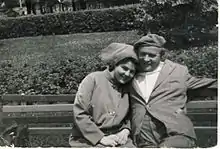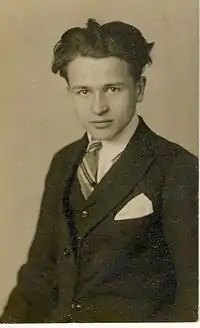Béla Vihar
Béla Vihar (Hungarian pronunciation: [ˈbeːlɒ ˈvihɒr]) (23 May 1908 – 24 November 1978), born Béla Weisz, was a Hungarian poet, journalist, writer and teacher. He is known for his book entitled "Yellow Book, Facts of the Wartime Sufferings of Hungarian Jewry" which was the first documentary book about The Holocaust in the world. His famous poem, "A Soldier walking in the snow" (Egy katona megy a hóban, translated by László Tehel) commemorates all the soldiers who lost their lives in war.
Béla Vihar | |
|---|---|
 Béla Vihar with his daughter, Judit Vihar in 1965 | |
| Born | 23 May 1908 Hajdúnánás, Kingdom of Hungary |
| Died | 24 November 1978 (aged 70) Budapest, Hungary |
| Resting place | Kozma Street Cemetery |
| Occupation | poet journalist writer teacher |
| Language | Hungarian |
| Nationality | Hungarian |
| Period | 1924–1978 |
| Notable works | Yellow Book, Facts of the Wartime Sufferings of Hungarian Jewry |
| Notable awards | Attila József Prize |
| Spouse | Magda Widder (1915–2002) |
| Children | Judit Vihar Gábor Vihar (1948–1975) |
Biography and career

Béla Vihar was born on 23 May 1908 in Hajdúnánás. His parents were Samuel and Terez (nee Glucklich) Weisz, who would become Jewish victims of the Holocaust.
Béla married Magda Widder, the daughter of painter Félix Bódog Widder, and their daughter was Judit Vihar.[1]
His poems were published in English, Bulgarian, Czech, French, Hebrew, Croatian, German, Italian, Russian, Romanian, Spanish and Slovak languages. In the 1970s his radio drama "Der Fremde. Hörspiel – Ballade" (The Stranger. Radio Drama – Ballad) was a great success in Germany.
We two, alone:
We are two at the birth.
We are two in love, lonely
at the time of death[2]
References
- "Béla Vihar". Our Family History. Retrieved 13 February 2017.
- "Hungarian Haiku" (PDF). Retrieved 16 February 2017.
Awards and honors
- Attila József Prize – 1966
Bibliography
- "Vihar Béla" (PDF) (in Hungarian). Kaláka. Retrieved 13 February 2017.
Selected works
Books
- Vihar, Béla (1945). Yellow Book, Facts of the Wartime Sufferings of Hungarian Jewry. São Paulo. Budapest: Hechaluc. Archived from the original on 14 February 2017. Retrieved 13 February 2017.
Poems
- Út önmagadtól (1933)
- A szerelem születése (1958)
- Baráti asztal (1960)
- Önarckép 1962 (1962)
- A négy felelet (1965)
- Kígyóének (1970)
- Párbeszéd az idővel (1968)
- Küzdelem az angyallal (1973)
- Szamárháton (1976)
- Egy katona megy a hóban (1978)
- Az alkonyat kapujában (1980)
- Elröppent lakodalom (1984)
- Szíjak között (ed. Judit Vihar). Széphalom Könyvműhely, Budapest. 1998. (Disclosed: Among Phylacteries)
External links
![]() Media related to Béla Vihar at Wikimedia Commons
Media related to Béla Vihar at Wikimedia Commons
- Seed of Sarah, Memoirs of a Survivor. University of Illinois Press. June 1991. ISBN 9780252062193. Retrieved 13 February 2017.